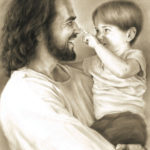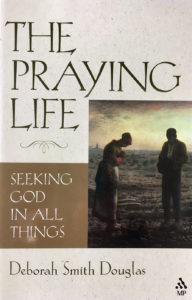Becoming Like Children
Every once in a while I realize—like Pooh Bear going downstairs: bumpedty-bump—what a lot I have to learn.  Usually I realize at the same time what a great sense of humor God must have—and how true it is that those who live in Christ will have their world turned upside down.
Usually I realize at the same time what a great sense of humor God must have—and how true it is that those who live in Christ will have their world turned upside down.
All this simultaneous realizing is pretty tiring, of course, and also a bit discouraging sometimes. I am a grown-up now, after all, with the Seriously Grown-Up Responsibility of being both a mother and teacher, and I would like a little respect, please, and a bit of peace and quiet if you don’t mind. Stability appeals to me, rather a lot.
As a cradle Presbyterian, I have spent most of my life in a tradition that places a premium on decency and order in the Christian life. As a busy wife and mother, I have a real stake in keeping—and encouraging my family to keep—domestic affairs well-organized and running smoothly. As a lawyer, I learned the value of predictability and control. As a teacher, I am quick to seize opportunities to instruct.
In other words, I spend a lot of time trying to hold the world right side up.
Therefore (God knows), I have a special need to be reminded that Jesus came to turn the world upside down, and that that has been, from the beginning, the mission of the Church (see Acts 17:6). I need to learn—again and again, it seems—that to be educated means to be led out, that to be faithful means to be open to surprises, that God may value joy and wonder as much as decency and order.
On two different occasions recently, young children have been instruments of grace to me, reversing my death-dealing sense of the fitness of things and inviting me into a new way of seeing God.
The first occurred when my five-year-old daughter asked me at breakfast one morning about her bedtime prayers. She wasn’t really sure, she admitted, just what to say to God. (Now this is the sort of opening I like: “Mom, teach us to pray.”) I poured orange juice and congratulated myself on such a splendid opportunity for age-appropriate instruction in confession and petition. “God likes to hear from us,” I told Emily, “the same things all mommies and daddies like to hear from their children: please and thank you and I’m sorry.”
Emily considered this, licking jam from her fingers in order to count to three: please; thank you; I’m sorry. She nodded, then waved the two unaccounted-for fingers and said, “Maybe there are two other things I say a lot that God would like to hear from me.”
“What’s that, honey?” I asked absently, beginning to clear the table (the lesson being over). “Maybe,” she suggested, “I could tell God ‘Wow!’ and ‘I love you.’ ”
I sat down, my hands full of silverware. Bumpedty-bump. “Yes, of course, darling, what a wonderful idea. Those are excellent prayers,” I assured her, and sent her off to brush her teeth. But when I got up a few moments later, I was under no illusions about who had received the lesson. I had forgotten—as I so often forget—that prayer begins in praise and adoration. God had pulled my Grownup-in-Charge-of-Religious-Education authority right out from under me (with love and laughter, I am sure) as a means of reminding me.
It is, alas, all too easy to forget the centrality of adoration and delight in our worship, especially when we place priority on our own dignity before God in church.
As my own daughter innocently showed me how narrow and formal my personal prayer was in danger of becoming, it took another couple of children to reveal the peril of joylessness in my participation in corporate worship.
It has long been my custom to attend midweek Eucharist at an Episcopal church near us (supplementing my Sunday Presbyterianism with a Wednesday dose of liturgy and sacrament). The quiet of the service and the intimacy of the small gathering mean a great deal to me. So I was frankly annoyed one morning recently to see that our familiar (predominately elderly, decidedly staid) ranks had been swelled by a young couple new to the parish, accompanied by their little boy and baby girl. “Oh great,” I grumbled to myself. “Suffer the little children to disrupt the service.” (There are moments, I confess, when I sympathize with the harried disciples who wanted to send the children away, lest they bother the Busy and Important Grownups in Charge.)
These children were sweet-natured and well-behaved; nevertheless, by the grace of God, they did indeed disrupt the service; they did indeed turn our decently-and-in-order expectations upside down.
When the dozen or so of the faithful present that morning gathered around the altar to receive Holy Communion, the priest blessed the babe in arms, making the sign of the cross on her infant forehead. For some reason this so charmed the baby that she laughed out loud, raising her flower of a face for more.
There isn’t a more infectious sound under heaven than that of happy baby laughter, and every one of us immediately responded in kind, startled into shared delight. The baby beamed at all of us, and for once we received the Body and Blood with smiling joy instead of funereal gravity.
The baby’s older brother was a poised five or six (participating in Communion as a baptized member of the parish, as is permitted in the Episcopal Church). He received the host, with his mother’s help, and the priest lifted the chalice to his lips. Perhaps he had never received in both kinds before; perhaps he took rather a larger sip than he intended; perhaps it was his first taste of real wine. In any event, when the priest withdrew the chalice, which had momentarily eclipsed his small face, the child’s round eyes and dropped jaw expressed such thunderstruck astonishment that all of us adults very nearly laughed out loud again, and bit our lips instead, not lest the proprieties be violated but lest we embarrass the child. Bumpedty-bump. Another learning.
William Johnston, a Jesuit who lived for many years in Japan, tells the story somewhere of a conversation he once had with a Buddhist monk who was curious about Catholic ritual. “What happens in the Mass?” the monk wanted to know. Father Johnston explained the liturgy step by step. The monk listened carefully without interrupting for some time. “Then,” Father Johnston continued, “the faithful come forward and receive the Body of Christ, and then go back to the pews and sing a song.” “They what?” The Buddhist was incredulous. “They receive the Body of Christ—they take God into their mouths—and they can stand up? They can walk? They can sing?
Christians receiving Communion, the Buddhist clearly felt, should be “astonished with a great astonishment, overcome with amazement,” like the people who witnessed Jesus’ raising of the little girl from the dead (see Mark 5:42), or like the little boy astounded by a taste of new wine.

Jesus blessing the children is, of course, a (perhaps dangerously) familiar image in our churches. Stained glass windows memorialize the text from Luke 18:16: “Let the children come to me, and do not hinder them.” Sunday School posters glorify the “humbleness of this child” praised in Matthew 18:4.
There is a subtle danger here of distorting the Gospel’s message. We do not well serve either children or the kingdom by sentimentalizing childhood into something it is not, nor by assuring ourselves that, unlike those awful disciples, we certainly do not forbid the children to approach Jesus. (On the contrary! Heavens, just look at the program designs, the staffing patterns! The curriculum options, the budget allocations!)
But there is another, sharper, point to the story. The people who were bringing the children to Jesus were doing so not that they might be biblically literate or politically correct. “They were bringing children to him,” Mark’s Gospel states clearly, “that he might touch them” (Mark 10:13–16).
Wise parents, those.
Jesus responded to the children by taking them in his arms and blessing them, laying his hands on them. He responded to the disciples with a warning: “Whoever does not receive the kingdom of God like a child shall not enter it” (Mark 10:15).
I wonder, reading Mark’s Gospel and reflecting on these (blessed) children in my life, if the kind of childlike reception of the kingdom Jesus meant does not so much depend on photogenic innocence or gratifying humility as on wholehearted trust, spontaneous joy, and a willingness to risk surprises.
Perhaps after all, to be children of God, children of light, is—more than I ever dreamed—about being willing to have the world turned upside down.
To be flabbergasted, utterly amazed, at a taste of Communion wine. To be delighted into laughter at the touch of a blessing hand. To pray “Wow!” and “I love you” with the simplicity of a five-year-old. Could these be glimpses of what it might mean to “receive the kingdom of God like a child”? (Luke 18:17).
If so, then the image of children in the arms of Jesus is far more than a sentimental and possibly self-congratulatory reminder that children as well as adults are fully members of the family of faith. That image is also a warning to us that unless we “become like children, [we] will never enter the kingdom of heaven” (Matthew 18:3).
There is an old story of Saint Francis of Assisi that is also an image of the kingdom of God, the communion of saints: an apparently endless line of the faithful through the ages, trying to follow Jesus. They are careful, devout, intent on getting it right. Eyes on the ground, ignoring all else, fitting their feet as precisely as possible into the footsteps of the Master. At the very end of the procession follows Francis, paying no attention to his feet or to himself at all, but focused wholly on the One at the head of the line—dancing in joyful adoration, his feet falling spontaneously just where they need to be, just as Christ had led the way.
My daughter would understand that—discipleship as dancing. She would live that way, pray that way, if I “hindered her not.”
Maybe even I could learn to live and pray like that, if I surrendered my need to get it right, my need (that I project on God) for all to be done decently and in order. If I could laugh for sheer delight at a blessing, if I could be overcome with amazement in the receiving of Communion, maybe by the grace of God even I might find myself saying yes to the kingdom of heaven.
Wow.

